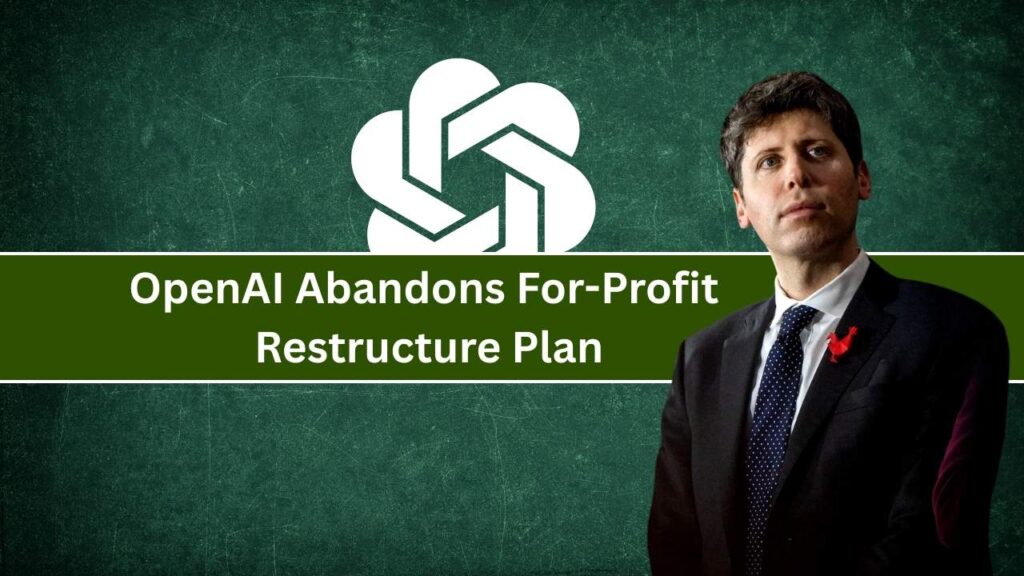OpenAI Abandons For-Profit Restructure Plan: In a sweeping and pivotal move that could reshape the future of artificial intelligence development globally, OpenAI abandons for-profit restructure plan, reaffirming its dedication to responsible, safe, and widely beneficial AI.

This game-changing decision comes after months of high-stakes internal deliberation, external scrutiny, legal investigations, and rising concerns from ethicists and policymakers alike. It marks a decisive return to OpenAI’s original mission: ensuring artificial general intelligence (AGI) benefits everyone—not just a few tech investors.
Founded in 2015 by a team of visionary technologists including Elon Musk and Sam Altman, OpenAI started as a nonprofit organization with a clearly stated goal: prevent AGI from being monopolized or misused. However, the growing demands of developing large-scale AI systems meant OpenAI needed substantial capital. To address this, they launched a “capped-profit” subsidiary in 2019, attracting billions in investments, most notably from Microsoft. By late 2023, there was discussion of converting that subsidiary into a traditional for-profit company. But after massive backlash, OpenAI decided instead to restructure as a Public Benefit Corporation (PBC) under the control of its nonprofit board.
OpenAI Abandons For-Profit Restructure Plan
| Feature | Details |
|---|---|
| Main Decision | OpenAI cancels full for-profit conversion plan |
| New Structure | Public Benefit Corporation (PBC) under nonprofit control |
| Reason | Ethical concerns, legal scrutiny, and mission alignment |
| Influential Parties | Elon Musk, state Attorneys General, former employees |
| Impact | Ensures nonprofit remains majority shareholder and guiding authority |
| Future Focus | Ethical, safe, and beneficial AI for the public |
| Official Website | openai.com |
OpenAI’s choice to abandon a full for-profit restructure in favor of a Public Benefit Corporation model under nonprofit control is more than a corporate governance decision—it’s a bold recommitment to values in a field that desperately needs them. As artificial intelligence becomes more integrated into society, the stakes are rising.
OpenAI’s revamped structure represents a blueprint for responsible innovation: one that invites funding without compromising principles. It reinforces the belief that powerful technologies can be developed ethically, transparently, and for the benefit of all.
Whether you’re a policymaker crafting regulations, an investor seeking sustainable growth, or an educator using ChatGPT in your classroom, this shift is a signpost pointing toward a more thoughtful, accountable AI future.
Why Did OpenAI Consider a For-Profit Model in the First Place?
To understand why this reversal is so significant, we need to look at why OpenAI considered a for-profit structure in the first place. As a nonprofit, OpenAI faced serious limitations in raising the billions of dollars needed to build cutting-edge AI models. Training large language models (LLMs) like GPT-4 requires enormous computing power, access to massive datasets, and top-tier AI researchers and engineers—costs that far exceed what typical nonprofits can raise through donations or grants.
In 2019, OpenAI adopted a novel approach: a “capped-profit” model, which allowed it to offer returns to investors—up to 100 times their original investment—while still operating under nonprofit oversight. This structure helped OpenAI raise major funding, including a multi-year, multi-billion-dollar partnership with Microsoft that included cloud infrastructure, research collaboration, and API integrations.
However, by 2024, conversations around removing the cap and converting into a traditional for-profit entity raised alarms. Critics feared that this would push OpenAI toward maximizing revenue rather than safeguarding public welfare. And those concerns weren’t just academic.
What Sparked the Backlash?
The backlash to OpenAI’s potential pivot to a full for-profit model was swift and multifaceted. Here are the key flashpoints:
- Elon Musk Lawsuit: Musk, who co-founded OpenAI and provided early funding, filed a lawsuit in early 2024, alleging the company had strayed from its original nonprofit mission.
- Legal Investigations: Attorneys General from California and Delaware began probing whether OpenAI had violated nonprofit rules by steering charitable assets toward private gain.
- Employee and Researcher Concerns: Former employees and AI researchers expressed ethical concerns that prioritizing profit could accelerate the release of unsafe or biased AI systems.
- Public Sentiment: Trust in OpenAI was declining, especially among users and educators concerned about how tools like ChatGPT were being deployed in classrooms and workplaces.
In response, OpenAI’s board conducted internal reviews, paused governance changes, and held public discussions. Ultimately, the leadership decided to restructure in a way that reaffirmed its mission and addressed stakeholder concerns.
What is a Public Benefit Corporation (PBC)?
A Public Benefit Corporation (PBC) is a legal classification that blends elements of nonprofit and for-profit governance. Unlike traditional corporations that must prioritize shareholder profits above all else, PBCs are legally obligated to pursue a stated public mission. This means leadership must consider the social and environmental impact of every major business decision.
In OpenAI’s case, becoming a PBC under nonprofit ownership means it can continue to raise money from investors and generate revenue, but always within a framework that values long-term societal good. Notably, the nonprofit entity retains majority control of the PBC, ensuring alignment with OpenAI’s founding vision.
Other companies like Patagonia, Kickstarter, and Allbirds have adopted this model to great effect. It’s particularly well-suited for tech firms that need scale but want to retain ethical guardrails.
What This Means for the Future of AI
OpenAI’s shift away from pure for-profit incentives sends a powerful message to the broader tech industry. Here are the key takeaways:
1. Nonprofit Oversight Remains Intact
The nonprofit parent organization will continue to oversee the PBC, holding a majority of voting shares and governance rights. This ensures that critical decisions—like when to release new AI models—are guided by ethical considerations, not just financial ones.
2. Rebuilding Public Trust
This move could help OpenAI regain trust from educators, developers, and policymakers. Reaffirming a public mission shows that the company is serious about preventing misuse, ensuring fairness, and supporting AI literacy.
3. Setting a Global Precedent
As one of the most prominent AI companies in the world, OpenAI’s governance model could influence how others—like Anthropic, Google DeepMind, and Meta AI—approach ethical development. The decision may also inspire policy reforms or global standards for AI governance.
4. Balance Between Capital and Ethics
By using a PBC model, OpenAI can still access the capital it needs to compete while embedding safeguards that protect against harmful outcomes. This dual-purpose model might become a new standard in responsible tech development.
How Professionals and Policymakers Can Prepare
Whether you’re a policymaker, investor, technologist, or educator, OpenAI’s new direction offers a few actionable lessons:
Understand the New Legal Landscape
Get familiar with the distinctions between nonprofit, for-profit, and PBC models. This knowledge can influence how you fund, regulate, or work with AI companies.
Anticipate Regulatory Growth
Governments around the world—from the EU to the U.S. and beyond—are crafting rules to govern AI. Expect new laws around transparency, bias, accountability, and consumer protection.
Push for Transparency and Ethics
As AI becomes more central to daily life, it’s essential for professionals to demand that companies disclose their training data, model limitations, and risk mitigation strategies.
Support Global AI Initiatives
Participate in international forums and agreements focused on AI ethics. Initiatives like the Global Partnership on AI and OECD AI Principles offer platforms for collaboration.
Real-World Impact: ChatGPT and Beyond
OpenAI’s decision isn’t just about boardroom politics—it has real-world implications. Products like ChatGPT, which now reaches over 100 million monthly users, are being used in schools, businesses, hospitals, and media organizations.
Ensuring that these tools evolve in a way that respects privacy, avoids bias, and supports public good is essential. OpenAI has promised continued investment in AI alignment research, safety testing, and content moderation—signaling that safety and usability will remain top priorities.
Google’s AI Podcast Tool Now Speaks 50 Languages – Including Hindi
Meta Launches New AI App That Could Replace Your Assistant – Try It Now
Elon Musk’s Shocking Prediction for the Future of Robotic Surgery: What You Need to Know
FAQs About OpenAI Abandons For-Profit Restructure Plan
Why did OpenAI abandon its for-profit plan?
Due to significant backlash, legal scrutiny, and concerns about losing public trust, OpenAI returned to a mission-aligned structure focused on safe and ethical AI.
What is a Public Benefit Corporation?
A PBC is a for-profit business that must consider its societal impact in all decisions. OpenAI’s PBC is still controlled by its nonprofit parent, ensuring ethical oversight.
Will this impact OpenAI’s partnership with Microsoft?
No significant changes have been announced. Microsoft remains a major partner, and the collaboration will likely continue under the new structure.
Does this mean OpenAI can’t make money?
OpenAI can still generate substantial revenue. The PBC model allows for profit, but within a legal framework that prioritizes public good.
Are other companies using this model?
Yes. Companies like Kickstarter and Allbirds use the PBC model to blend profit with purpose. OpenAI’s decision may encourage more tech firms to follow.








